|
|
|
Sort Order |
|
|
|
Items / Page
|
|
|
|
|
|
|
| Srl | Item |
| 1 |
ID:
095163
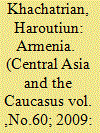

|
|
|
|
|
| Publication |
2009.
|
| Summary/Abstract |
The world crisis interrupted the stable economic growth Armenia had been enjoying for the past fifteen years. Progressive development began in 1994, whereby between 2001 and 2007 the growth indices reached double digits. In 2008, the increase in GDP came to a halt due to the Russian-Georgian war and amounted to only 6.8%. And as early as the first six months of 2009, the GDP began to decrease, dropping as low as 16.3% compared to the same period of the previous year, which is one of the worst indices for the entire CIS. In July, the drop in GDP amounted to 18.7%, which encouraged people to think that the crisis had bottomed out.
|
|
|
|
|
|
|
|
|
|
|
|
|
|
|
|
| 2 |
ID:
112999
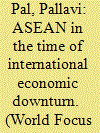

|
|
|
| 3 |
ID:
125207


|
|
|
|
|
| Publication |
2013.
|
| Summary/Abstract |
President Obama's post-election visit to Asia last November was a vivid reminder that America is in the process of making a strategic pivot east. That Burma was one of his destinations was good for many reasons, one of which was to remind the development community that this country is once again full of potential, as it was half a century ago. Indeed, in the 1960s Burma, along with the Philippines and Sri Lanka (then Ceylon), was seen as one of the most likely candidates in Asia to follow Japan into sustained economic growth. The fact that neither Burma nor Ceylon nor the Philippines ever quite made it-indeed, for different reasons, each became an also-ran in terms of development-is an interesting story in its own right, but a topical one too. After years of frustrated hopes and dashed expectations, each of these countries, surprisingly, has another chance to fulfill its long-stalled potential. Development delayed, it seems, is not necessarily development lost.
|
|
|
|
|
|
|
|
|
|
|
|
|
|
|
|
| 4 |
ID:
082015
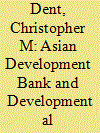

|
|
|
|
|
| Publication |
2008.
|
| Summary/Abstract |
The Asian Development Bank (adb) has made increasingly important contributions to Asia's (and particularly East Asia's) regionalism over recent years, and especially since Haruhiko Kuroda became the Bank's president in February 2005. This paper argues that the adb's role here has become more significant because of the strong 'developmental' characteristics of East Asia's new regionalism. This is not least because, as a regional development bank, the adb has a predilection for linking development, regionalism and capacity-building together when promoting regional co-operation and integration (rci) in Asia. We may refer to this as 'developmental regionalism', where rci activities are particularly orientated to enhancing the economic capacity and prospects of less developed countries with the view of strengthening their integration into the regional economy, and thereby bringing greater coherence to regional community building overall. This analysis is partly based on field research undertaken by the author involving a series of research interviews conducted amongst adb officials and with outside analysts of the organisation. It first examines the evolution of the Bank's stance and policies on rci, and the impact made by President Kuroda and the newly formed Office of Regional Integration (orei) in this regard. The main developments of East Asia's new regionalism are then outlined from finance and trade perspectives. Thereafter, an evaluation is made of the adb's contributions toward the emerging developmental regionalism in East Asia
|
|
|
|
|
|
|
|
|
|
|
|
|
|
|
|
| 5 |
ID:
126105
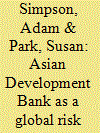

|
|
|
|
|
| Publication |
2013.
|
| Summary/Abstract |
The Asian Development Bank (adb) is engaged in development projects throughout the Greater Mekong Subregion, although for most of the past two decades it has boycotted Myanmar (Burma) because of donor government sanctions. Despite being criticised for its neoliberal focus and its lack of transparency and accountability, the adb's operations compare favourably to those of the Myanmar government and many transnational corporations constructing and financing projects there. This article engages with the concept of risk, which increasingly frames how development in fragile states like Myanmar is understood, to critically analyse the adb's nascent re-engagement in Myanmar according to the risks this poses for five constituencies: the adb itself; donor states; the Myanmar government and military; private capital; and marginalised communities. While deeper engagement in Myanmar poses different risks for each group, critical analysis suggests that the adb must increase the genuine participation of civil society actors in its activities to address the most significant risks of all, those facing marginalised communities.
|
|
|
|
|
|
|
|
|
|
|
|
|
|
|
|
| 6 |
ID:
002186
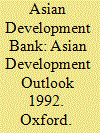

|
|
|
|
|
| Publication |
Oxford, Oxford Univ. Pr., 1992.
|
| Description |
xiii.,313p,figures,tables
|
| Standard Number |
0-19-585742-9
|
|
|
|
|
|
|
|
|
|
|
|
Copies: C:1/I:0,R:0,Q:0
Circulation
| Accession# | Call# | Current Location | Status | Policy | Location |
| 033766 | R 332.1505/ASI;1-2 033766 | Main | On Shelf | General | |
|
|
|
|
| 7 |
ID:
105313
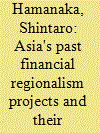

|
|
|
|
|
| Publication |
2011.
|
| Summary/Abstract |
This article analyzes five significant institutional variables related to membership and control of institutions, using comparative case studies of Asia's past regional financial projects from the 1950s through the 1990s. The five variables are: (i) countries included in or excluded from membership, (ii) membership tiers, (iii) institutional decision-making process, (iv) executive positions at organizational structure (e.g. secretariat and headquarters) of institutions, and (v) the location of the secretariat/headquarters. Past financial regionalism projects hold several important lessons for current initiatives. First, in the case of regional financial institutions, "inclusion in membership but exclusion from regional membership" is a possible option and it is crucial to go beyond the simple debate on the membership problem, namely inclusion and exclusion, when designing a regional financial institution. Second, no single country should dominate the decision-making process by voting power-an institution must maintain a delicate balance among its members in terms of voting. And finally, key to determining the success or failure of regional financial institutions is which country hosts the secretariat/headquarters and sends staff to the executive positions.
|
|
|
|
|
|
|
|
|
|
|
|
|
|
|
|
| 8 |
ID:
185557
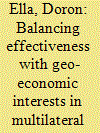

|
|
|
|
|
| Summary/Abstract |
Since its inception in December of 2015, scholars and policy-makers have been debating the motivations behind the design of the AIIB. This paper advances this debate by exploring whether and how the AIIB’s structure follow the design pattern of other leading MDBs, and how well did it manage to integrate institutional effectiveness considerations with promoting its largest shareholders’ geo-economic interests. It does so by comparing the design of the AIIB with that of the ADB and the World Bank, while integrating several approaches to institutional design. I argue that the AIIB’s architects identified certain functional deficiencies in the performance of existing financial institutions and attempted to establish an alternative that will better address these deficiencies. To achieve that, they tried to balance between certain structural features that promote institutional performance with features that promote powerful creditors’ geo-economic interests, as well as invest in AIIB’s attractiveness vis-à-vis other financial institutions. This paper finds that in multilateral development banks power considerations tend to overshadow issues of institutional effectiveness, while sometimes these are successfully integrated. And, that powerful actors are able to politicize certain functional design features and reassign their purpose from solving cooperation problems to advancing geo-economic interests.
|
|
|
|
|
|
|
|
|
|
|
|
|
|
|
|
| 9 |
ID:
081272
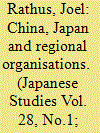

|
|
|
|
|
| Publication |
2008.
|
| Summary/Abstract |
This paper examines the impact of 'the rise of China' on the Asian Development Bank (ADB), and its implications for Japan. Japan has traditionally enjoyed a dominant position in the Bank, as it has enjoyed a dominant position in Asia. However, with the balance of power in the region tipping in China's favour, one might expect that this would be reflected in the ADB as well. This paper argues that despite the worsening Sino-Japanese relationship, the ADB has facilitated the development and maintenance of shared expectations between the two parties over the future direction of development assistance, representing an oasis of liberal institutionalism in a relationship increasingly characterised in realist terms.
|
|
|
|
|
|
|
|
|
|
|
|
|
|
|
|
| 10 |
ID:
112144


|
|
|
|
|
| Publication |
2012.
|
| Summary/Abstract |
This paper discusses the political opportunity structures which facilitated the creation of sites of interaction and protest against the Asian Development Bank during the Bank's Annual General Meeting in Chiang Mai, Thailand, in 2000. The factors which facilitated the coming together of Thai social movements and their regional and international counterparts are mainly their shared critique of the neo-liberal paradigm and its adverse effects on their respective countries. The strategies they used to highlight these effects enhanced their sites of engagement and confrontation with the Bank and included dialogue with Bank officials, demonstrations, and the use of the media to highlight their concerns. Importance was also placed on the manner in which they were able to mobilize resources for the anti-Asian Development Bank campaigns and the process by which they framed their issues to gain the sympathy and support of the public. The 1997 Asian financial crisis, which highlighted the shortcomings of the Bank's development paradigm, as well as the ongoing democratization process in Thailand during that period, provided the impetus in fostering the anti-globalization alliances of local and transnational social movements in a common venue.
|
|
|
|
|
|
|
|
|
|
|
|
|
|
|
|
| 11 |
ID:
155389
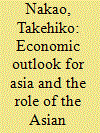

|
|
|
|
|
| Summary/Abstract |
This article reviews the history of establishing the Asian Development Bank (ADB) with an original 31 members in 1966. It goes on to describe the changes that have occurred in Asia in the intervening years during which membership has grown to 67, including 48 from within Asia and the Pacific and 19 outside. It also discusses the economic outlook in Asia and the relationship between ADB and People's Republic of China. The article then gives an overview of the current organization and operations of the ADB. This article concludes by eight conditions for development that make countries reach the upper-middle-income status.
|
|
|
|
|
|
|
|
|
|
|
|
|
|
|
|
| 12 |
ID:
100404
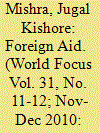

|
|
|
| 13 |
ID:
117151


|
|
|
| 14 |
ID:
119686


|
|
|
|
|
| Publication |
2013.
|
| Summary/Abstract |
Do regional hegemons use their power in regional organizations to advance foreign policy objectives? The authors investigate whether Japan leverages its privileged position at the Asian Development Bank (adb) to facilitate project loans for the elected Asian members of the United Nations Security Council (UNSC), a platform from which it seeks to shape global affairs. Analyzing panel data of adb loan disbursements to twenty-four developing member-countries from 1968 to 2009, the authors find that temporary UNSC membership increases adb loans, particularly during the post-1985 period, when Japan asserted greater influence in multilateral organizations. They estimate an average increase of over 30 percent. Because of Japan's checkered history of imperialism, the adb provides a convenient mechanism by which the government can obfuscate favors for politically important countries. Acting through this regional organization enables Japan to reconcile a low-key approach to foreign affairs with the contradictory goal of global activism-leading without appearing unilateralist.
|
|
|
|
|
|
|
|
|
|
|
|
|
|
|
|
| 15 |
ID:
050038
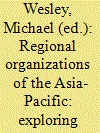

|
|
|
|
|
| Publication |
New York, Palgrave Macmillan, 2003.
|
| Description |
xiv, 247p.
|
| Standard Number |
1403903638
|
|
|
|
|
|
|
|
|
|
|
|
Copies: C:1/I:0,R:0,Q:0
Circulation
| Accession# | Call# | Current Location | Status | Policy | Location |
| 047429 | 337.15/WES 047429 | Main | On Shelf | General | |
|
|
|
|
| 16 |
ID:
118930
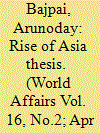

|
|
|
| 17 |
ID:
112991
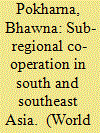

|
|
|
| 18 |
ID:
138925
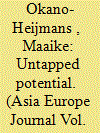

|
|
|
|
|
| Summary/Abstract |
This policy brief assesses the operations of the Asian Development Bank (ADB) and provides an analysis of the Bank’s relevance for its European member countries today and tomorrow. One important reason for Europe’s 17 member countries to engage with the ADB lies in the Bank’s contributions to a prosperous, stable and more integrated Asia-Pacific. The ADB positively contributes to European countries’ economic diplomacy and offers valuable opportunities to reinforce ties with players that are quickly strengthening their role and influence in global politics and economics. Furthermore, the Bank’s non-Western diplomatic style provides lessons on how to operate successfully in tomorrow’s world, wherein Europe will be less influential. European countries would do well to strengthen their engagement with the ADB and assist the Bank in maintaining legitimacy and relevance towards the future.
|
|
|
|
|
|
|
|
|
|
|
|
|
|
|
|
|
|
|
|
|